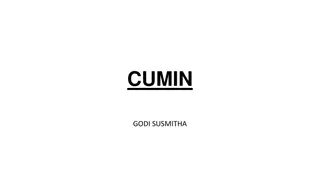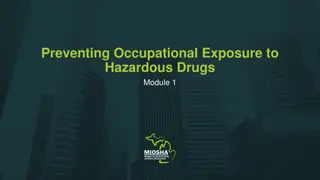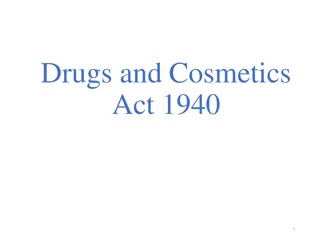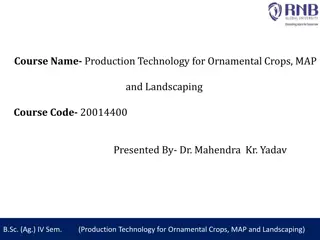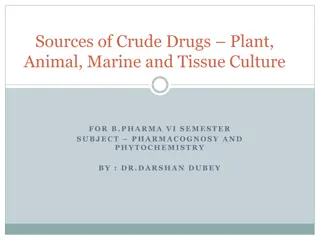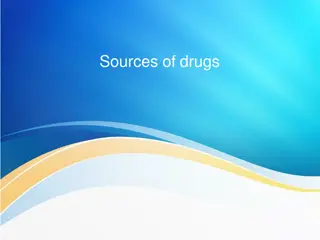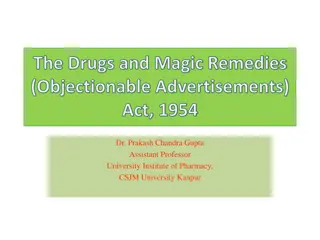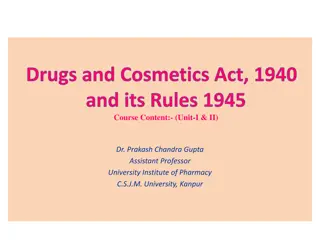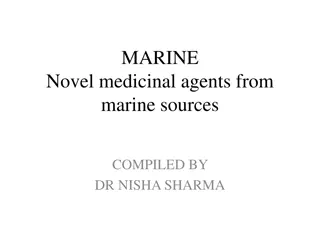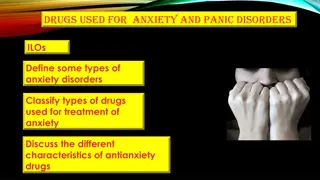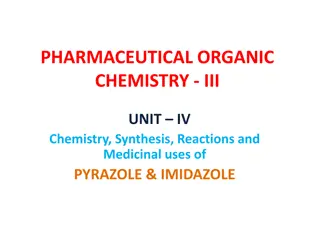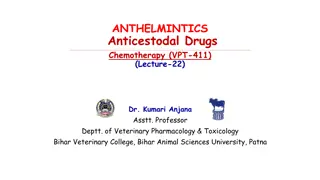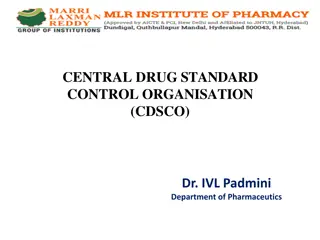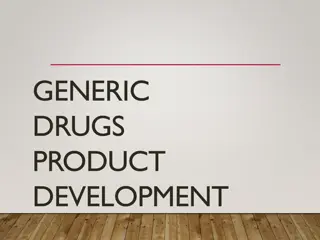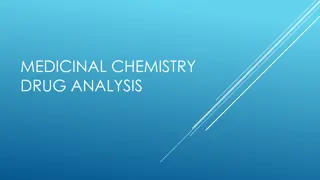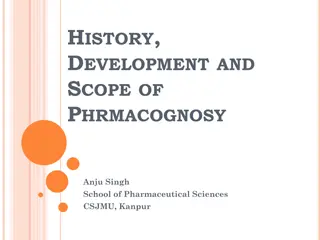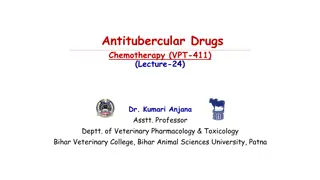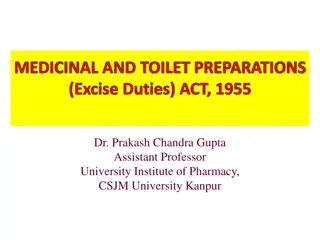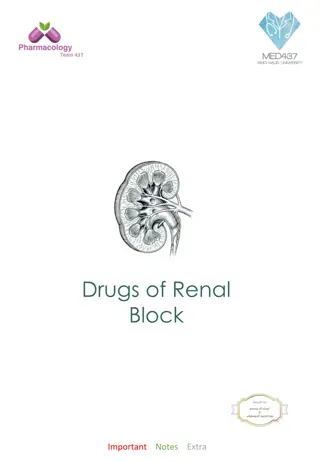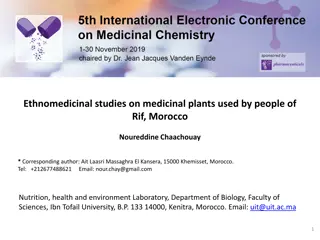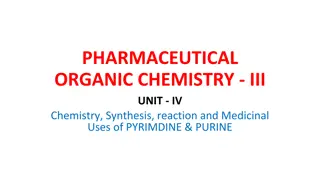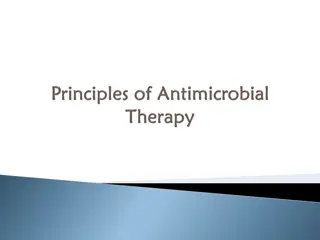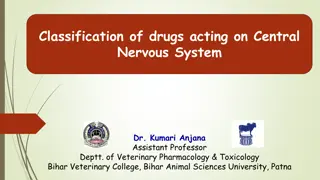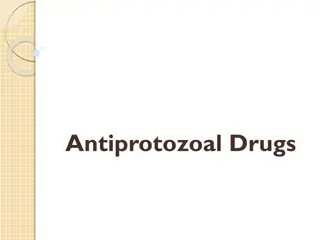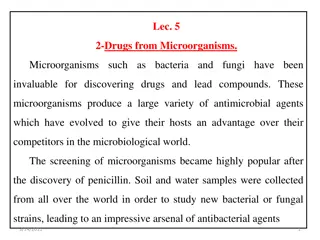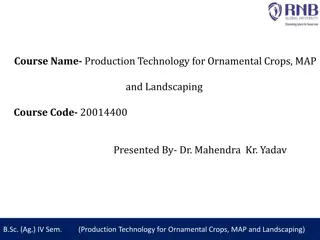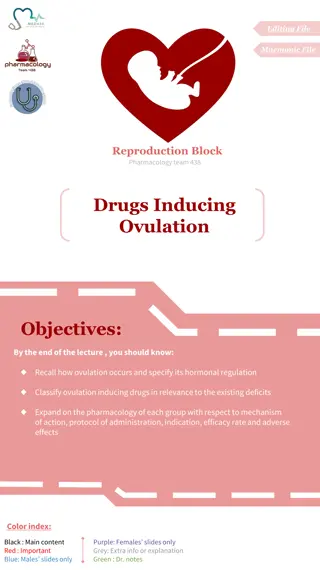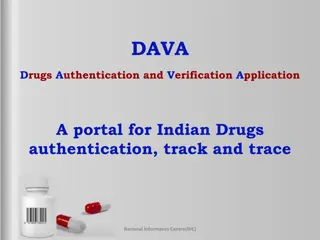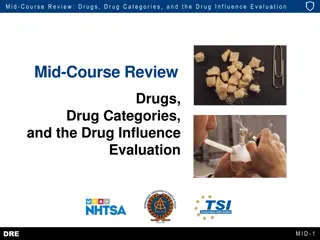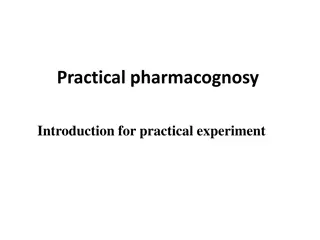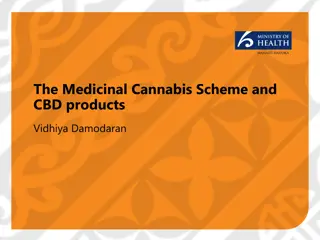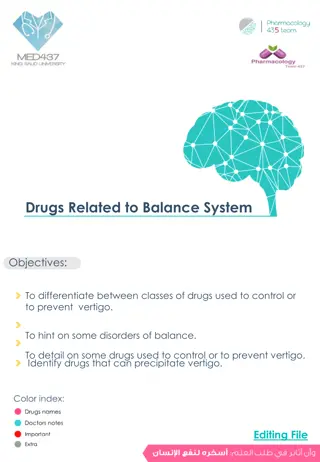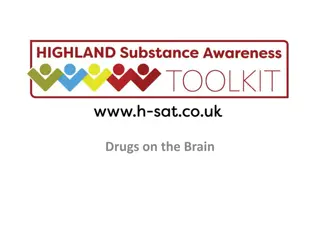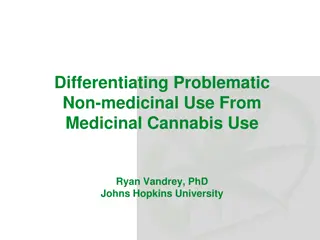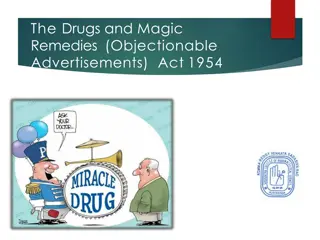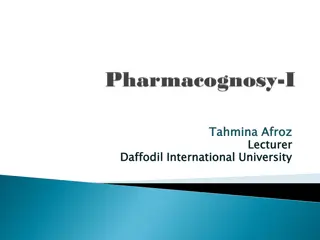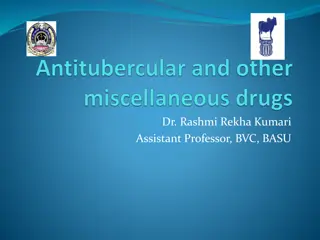Understanding Tannins: Properties, Classification, and Medicinal Uses
Tannins are secondary metabolite products with astringent properties, high molecular weight, and various solubility and taste characteristics. They can be classified into true tannins and pseudo-tannins based on the Goldbeater skin test, as well as hydrolysable and condensed tannins based on chemica
6 views • 13 slides
Cumin: A Versatile Spice with Rich History and Uses
Cumin, scientifically known as Cuminum cyminum L., is a widely used spice with a rich history and versatile culinary and medicinal uses. Originating from Egypt and widely cultivated in countries like India, cumin seeds are known for their aromatic flavor and are essential in various cuisines worldwi
0 views • 11 slides
Occupational Exposure to Hazardous Drugs: Risks and Prevention
Learn about the hazards of exposure to hazardous drugs, including potential health risks such as cancer, nausea, reproductive toxicity, and organ damage. Explore training modules, drug categories, and a list of hazardous drugs to ensure workplace safety. Discover NIOSH criteria for identifying hazar
1 views • 42 slides
Overview of Drugs and Cosmetics Act, 1940
The Drugs and Cosmetics Act of 1940 was enacted to regulate the import, manufacture, distribution, and sale of drugs and cosmetics in India. The Act aims to ensure high standards of medical treatment, prevent substandard drugs, and establish advisory boards for different types of drugs. It sets out
0 views • 49 slides
Production Technology for Ornamental Crops and Landscaping Course Overview
This course provides a comprehensive study on the production technology for ornamental crops, medicinal plants, and landscaping practices. Topics include identification of different crops, landscaping principles, package of practices for flowers, processing techniques, and more. Students will learn
1 views • 14 slides
Sources of Crude Drugs: Plant, Animal, Marine, and Tissue Culture in Pharmacognosy
Crude drugs are natural substances obtained from plants, animals, and minerals. They are used without much processing and have therapeutic properties. Different plant parts like leaves, flowers, fruits, seeds, roots, bark, and stems yield various important drugs. Animals and minerals also serve as s
1 views • 19 slides
Sources of Drugs and Their Origins
Drugs can be sourced from six major categories: plants, animals, minerals/earth, microbiological sources, semi-synthetic sources, synthetic sources, and recombinant DNA technology. Plant sources, being the oldest, provide various medicinal properties through leaves, flowers, fruits, seeds, roots, ba
0 views • 11 slides
The Drugs and Magic Remedies (Objectionable Advertisements) Act, 1954 Overview
The Drugs and Magic Remedies (Objectionable Advertisements) Act of 1954 regulates the advertising of drugs and remedies claiming magical properties in India. It defines drugs and magic remedies, prohibits certain types of advertisements related to drugs, and aims to control misleading marketing prac
0 views • 12 slides
Overview of Drugs and Cosmetics Act, 1940 and Its Rules 1945
The Drugs and Cosmetics Act of 1940 and its Rules of 1945 were established to regulate the import, manufacture, distribution, and sale of drugs and cosmetics in India. The Act ensures that only qualified individuals are involved in these processes and aims to prevent the entry of substandard or spur
0 views • 116 slides
Marine Novel Medicinal Agents from Marine Sources Compiled by Dr. Nisha Sharma
Oceans, covering more than 70% of the Earth's surface, harbor a plethora of invertebrates and algal species, providing a rich source of medicinal compounds. Marine organisms have yielded commonly used drugs like shark and cod-liver oils, sodium alginate, agar-agar, and chitin. Various classification
1 views • 9 slides
Overview of Anxiety Disorders and Antianxiety Drugs
Anxiety disorders are conditions characterized by excessive worry and fear that can interfere with daily life. Common types include generalized anxiety disorder, panic disorder, phobias, and OCD. Treatment options include psychotherapy and anxiolytic drugs such as benzodiazepines, 5HT1A agonists, be
0 views • 25 slides
Chemistry and Medicinal Uses of Pyrazole & Imidazole
Explore the chemistry, synthesis, reactions, and medicinal applications of pyrazole and imidazole compounds in pharmaceutical organic chemistry. Dive deeper into the molecular structures and understand the significance of these compounds in drug development and therapy.
1 views • 20 slides
Overview of Anticestodal Drugs in Veterinary Pharmacology
Anticestodal drugs play a crucial role in combating tapeworm infections in veterinary medicine. These drugs are classified into taeniafuges and taenicides, with examples of natural and synthetic compounds highlighted. Natural compounds like pumpkin seeds and male fern are traditionally used for thei
0 views • 29 slides
Overview of Central Drug Standard Control Organisation (CDSCO) in India
The Central Drug Standard Control Organisation (CDSCO) is the main regulatory body in India for pharmaceuticals, medical devices, and clinical trials. It functions under the Directorate General of Health Services, Ministry of Health and Family Welfare, Government of India. The CDSCO is responsible f
0 views • 18 slides
Understanding Generic Drugs and Brand Name Medications
Generic drugs are identical copies of brand-name medications in dosage, strength, quality, and intended use. They contain the same active ingredients but are sold under their chemical name. This article explores the basic differences between generic and brand-name drugs, when generic drugs are marke
0 views • 20 slides
Exploring Medicinal Chemistry and Drug Analysis
Medicinal chemistry involves the discovery and development of therapeutic chemicals for medicine, focusing on the interaction of compounds with biological systems. It explores the benefits and drawbacks of drugs, emphasizing the importance of safety and efficacy. Examples such as morphine, barbitura
0 views • 16 slides
History, Development, and Scope of Pharmacognosy
Pharmacognosy is the study of medicinal uses of crude drugs obtained from plants and natural resources. It involves researching physical, chemical, and biological properties of drugs from natural sources. The history of pharmacognosy dates back to prehistoric times, where the use of medicinal plants
0 views • 17 slides
Overview of Antitubercular Drugs: Introduction, Classification, and Applications
Tuberculosis is a chronic granulomatous disease caused by Mycobacterium bovis in ruminants and Mycobacterium avium in dogs and pigs. These bacteria have a unique waxy appearance due to their cell wall composition, providing a shield against pharmacological compounds. Antitubercular drugs play a cruc
3 views • 28 slides
Understanding the Medicinal and Toilet Preparations (Excise Duties) Act, 1955
The Medicinal and Toilet Preparations (Excise Duties) Act, 1955 was introduced to standardize excise duties on alcohol-containing medicinal and toilet preparations across India. It aims to regulate the collection of levies, ensure uniformity in duty rates, and address irregularities from previous ac
0 views • 35 slides
Understanding Renal Block: Drugs, Excretion, and Treatment Essentials
Renal block plays a crucial role in drug excretion, with processes like glomerular filtration and tubular secretion affecting drug elimination. Factors like blood flow, physiochemical properties, and urine pH influence renal excretion of drugs. Competition between drugs for transporters can have ben
0 views • 10 slides
Ethnomedicinal Studies on Medicinal Plants in Rif, Morocco
This study conducted in the Rif region of Morocco aimed to identify medicinal plants used by local people to treat digestive system disorders. The research documented 87 plant species from 43 families, highlighting the community's reliance on traditional ethnomedicinal knowledge. Results indicated T
2 views • 14 slides
Chemistry, Synthesis, Reactions, and Medicinal Uses of Pyrimidine & Purine
Explore the fascinating world of pharmaceutical organic chemistry in Unit IV, focusing on the chemistry, synthesis, reactions, and medicinal applications of Pyrimidine and Purine compounds. Dive deep into the structures, properties, and pharmacological significance of these essential molecules throu
1 views • 15 slides
Advances in Antimicrobial Drugs: Selective Toxicity and Classification
The development of antimicrobial drugs has significantly improved therapeutics by controlling infections and preventing complications. These drugs target invading microorganisms using selective toxicity, sparing host cells. Antimicrobial drugs are classified based on site, mechanism of action, and c
0 views • 30 slides
Classification of Drugs Acting on Central Nervous System
The Central Nervous System (CNS) plays a crucial role in coordinating the body's functions and responses to the environment. Drugs acting on the CNS can be classified into CNS stimulants and CNS depressants. CNS stimulants include spinal, medullary, and cortical stimulants, with various direct and i
0 views • 10 slides
Understanding Antiprotozoal Drugs: A Brief Overview
Protozoal infections are widespread, impacting both developed and underdeveloped regions due to globalization. Antiprotozoal drugs are crucial for treating diseases like malaria, amebiasis, and more. However, these drugs can have potent toxic effects on host cells. This article delves into the class
0 views • 29 slides
Microorganisms: A Treasure Trove of Medicinal Compounds
Microorganisms like bacteria and fungi have been crucial in the discovery of drugs, especially antibiotics. The screening of microorganisms has led to the identification of various bioactive substances with therapeutic applications spanning from antibacterial agents to anti-cancer drugs. The success
1 views • 19 slides
Production Technology for Ornamental Crops, MAP, and Landscaping Overview
This course covers the production technology for ornamental crops, medicinal and aromatic plants, and landscaping principles. It includes identifying different types of plants, cultivation practices, medicinal uses, and processing techniques. Specific focus is given to the production technology of a
0 views • 10 slides
Pharmacology of Ovulation-Inducing Drugs
Understanding the mechanism of ovulation and hormonal regulation is key in classifying drugs used to induce ovulation. This lecture covers the pharmacology of different groups of drugs, their mechanisms of action, administration protocols, indications, efficacy rates, and adverse effects. Antiestrog
0 views • 6 slides
DAVA Drugs Authentication & Verification Application by National Informatics Centre
The DAVA Drugs Authentication & Verification Application, developed by the National Informatics Centre of the Government of India, enables authentication, tracking, and tracing of Indian drugs at different packaging levels. Manufacturers maintain Unique Serial Numbers for primary and secondary packa
2 views • 42 slides
Comprehensive Review of Drugs, Categories, and Drug Influence Evaluation
This mid-course review covers key aspects such as defining drugs, naming drug categories and subcategories, identifying drug categories for specific drugs, components of drug influence evaluation, and examinations conducted as part of the evaluation process. The content also includes identifying dru
0 views • 28 slides
Introduction to Practical Pharmacognosy: Study of Medicines from Natural Sources
Pharmacognosy is the study of medicines derived from natural sources, exploring drugs from plants through the lenses of botany, chemistry, and pharmacology. This includes the classification of vegetable drugs based on taxonomic, chemical, and morphological characteristics. Understanding key points f
0 views • 19 slides
Overview of Medicinal Cannabis Scheme and CBD Products in New Zealand
The Medicinal Cannabis Scheme in New Zealand aims to improve access to quality medicinal cannabis products for patients by setting up a licensing regime for manufacture and supply. It establishes minimum quality standards to ensure consistency and quality of prescribed products. Access to medicinal
0 views • 10 slides
Understanding the Impact of Drugs on Pregnancy Development
This lecture covers factors influencing placental transfer, harmful effects of drugs at different developmental stages, FDA classifications of drugs, and teratogenic drugs. It explains how drugs cross the placenta, including physiochemical properties and stage of development affecting transfer. The
0 views • 10 slides
Drugs Related to Balance System and Vertigo Management
Understanding the classes of drugs used to control or prevent vertigo, identifying disorders of balance, and detailing drugs used for vertigo management. Learn about drugs that can trigger vertigo and the mind map of specific treatments involving various medications.
0 views • 13 slides
Understanding Drugs and Their Effects: A Comprehensive Exploration
This session delves into the world of drugs, highlighting the characteristics and effects of substances like cannabis, heroin, LSD, ecstasy, cocaine, and NPS. Participants engage in activities matching drug descriptions with names, followed by developing presentations on the drugs. Discussions inclu
0 views • 8 slides
Understanding Problematic vs. Medicinal Cannabis Use
Cannabis presents a unique case of transitioning from illicit to legal status, highlighting the importance of distinguishing between problematic non-medicinal and medicinal use. Despite availability and changing laws, there's a risk of transitioning from medicinal to problematic use, necessitating c
0 views • 18 slides
Understanding the Drugs and Magic Remedies Act 1954
The Drugs and Magic Remedies Act 1954 regulates the advertisement of drugs and prohibits the promotion of remedies claiming magical qualities. It defines various terms related to drugs and advertisements, while emphasizing the need for ethical and truthful advertising to protect the public. The Act
0 views • 26 slides
Overview of Pharmacognosy and Natural Products
Pharmacognosy is the study of medicinal drugs derived from natural sources, focusing on the properties and origins of crude drugs like plants and animals. The term was coined in 1815, emphasizing knowledge of drugs' physical, chemical, and biological properties. It is associated with various branche
0 views • 18 slides
Understanding Date Rape Drugs: Rohypnol and GHB
Date rape drugs, often referred to as club drugs, are commonly used at dance clubs, concerts, raves, and parties. Rohypnol, also known as Roofies, is a depressant drug prescribed in Europe for sleep and pre-surgery relaxation. It is orally taken in various colored pills, such as olive green or white
0 views • 38 slides
Understanding Anti-Tubercular Drugs: Mechanisms and Clinical Utility
Streptomycin, isoniazid, rifampin, and other anti-TB drugs are crucial in treating tuberculosis. Learn about first-line, second-line, and newer drugs, along with combination therapy. Explore the mechanisms and clinical applications of these drugs in combating TB infections.
0 views • 16 slides

